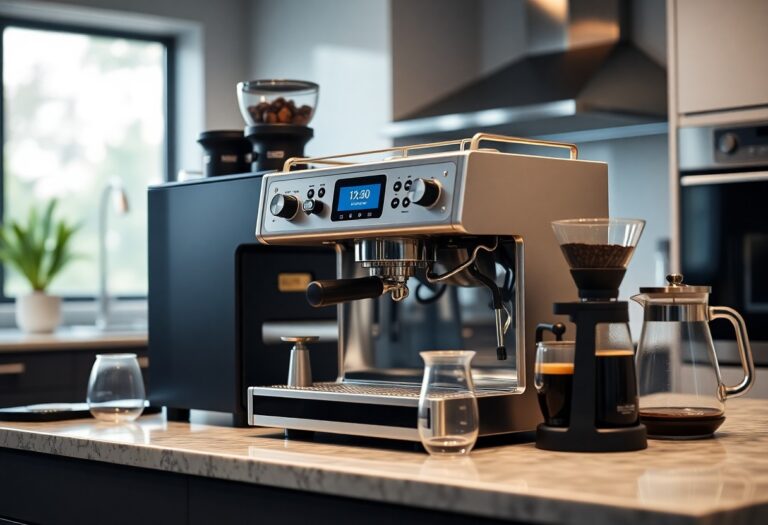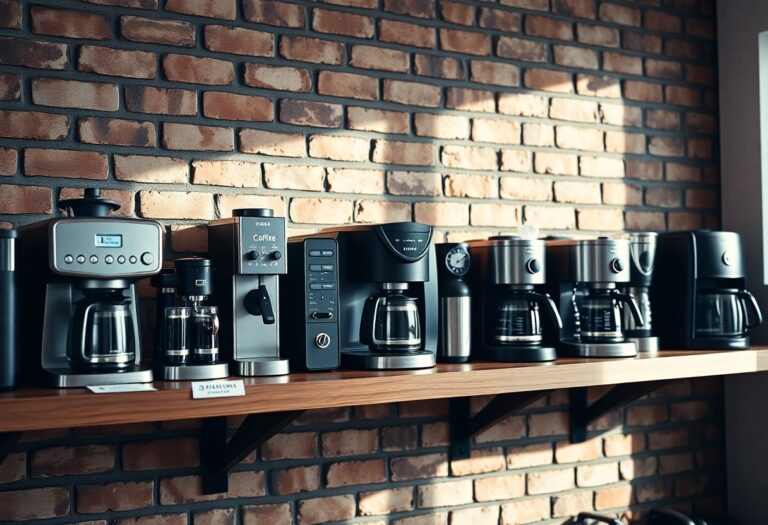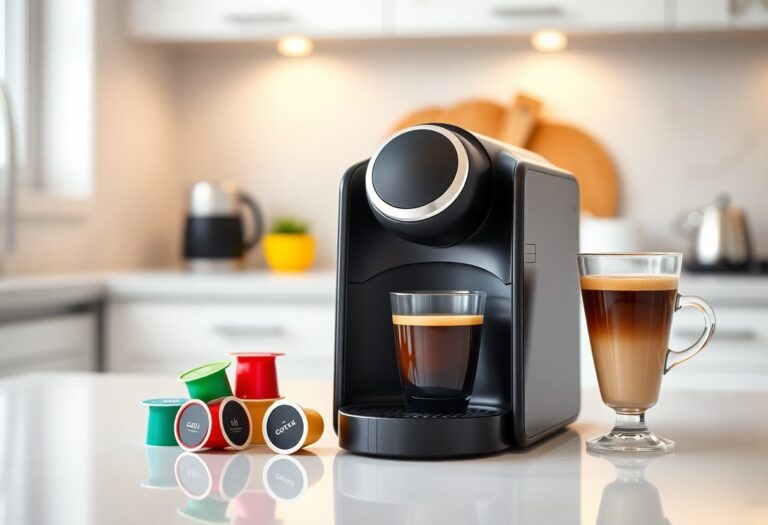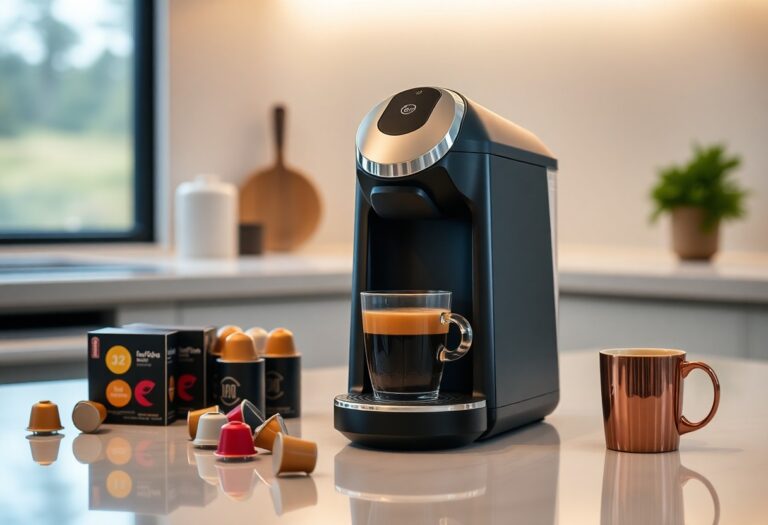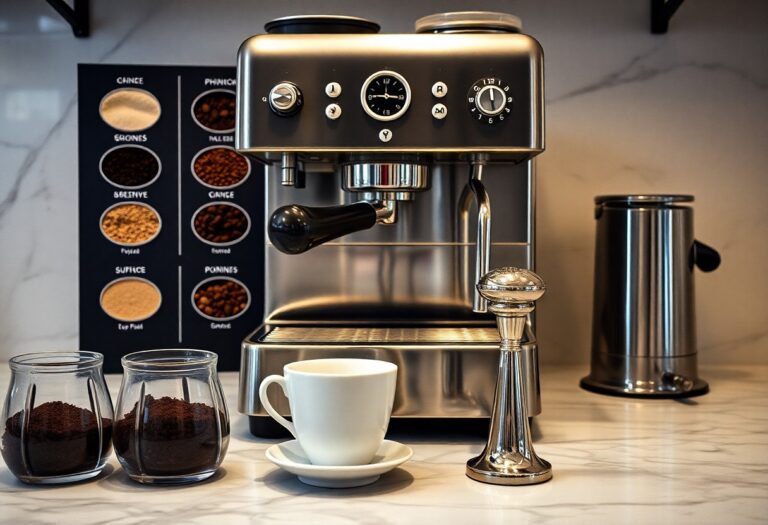Which Coffee Machine to Buy – Comprehensive Selection Guide
Machine selection can significantly impact your daily coffee experience. With so many options available, it’s vital to find one that perfectly matches your brewing preferences and lifestyle needs. This guide will walk you through key factors like budget, brew style, and features so you can confidently choose the coffee machine that elevates your mornings. Let’s probe the world of coffee machines and uncover the details that matter most to you.
Key Takeaways:
- Determine your brewing style; options vary from drip coffee makers to espresso machines, each suited for different preferences.
- Consider the maintenance and cleaning requirements of the machine to ensure long-term use without added hassle.
- Evaluate the machine’s capacity to match your household needs, whether you brew for one person or a whole family.
- Look for additional features like programmable settings, built-in grinders, or milk frothers that enhance convenience and versatility.
- Compare price points and build quality to find a balance between budget and durability that aligns with your coffee habits.

Decoding Coffee Machine Specifications
Understanding coffee machine specifications enables you to make informed choices that align with your brewing preferences. Key specs include brewing methods, grinder types, and additional features that enhance user experience. Monitoring the water temperature, brew time, and even the pressure of espresso machines can dramatically alter your coffee’s final flavor. Comparing these attributes aids in selecting a machine that delivers your ideal cup of coffee.
The Importance of Brew Methods
Your choice of brew methods significantly influences the taste, aroma, and texture of your coffee. Different techniques, such as drip, French press, or espresso, cater to various flavor profiles and brewing times. For example, espresso machines extract rich flavors quickly using high pressure, while pour-over methods allow for more control over the brewing process, highlighting specific bean characteristics. Selecting a machine that aligns with your preferred method ensures a satisfying coffee experience.
Understanding Grinder Types and Their Impact
The type of grinder used plays a vital role in the quality of your coffee. Burr grinders provide consistent particle size, promoting uniform extraction, while blade grinders can lead to uneven grind sizes affecting flavor. For instance, espresso requires a fine grind, whereas a French press typically calls for a coarser consistency. Investing in a high-quality grinder can elevate your coffee experience substantially, impacting overall flavor and quality.
| Grinder Type | Impact on Flavor |
| Burr Grinder | Consistent grinding for even extraction |
| Blade Grinder | Inconsistent grind leading to uneven taste |
| Manual Grinder | Control over grind size, labor-intensive |
| Electric Grinder | Convenience with less physical effort |
Different grinder types yield various results that can significantly impact your brew. A burr grinder, for example, provides a uniform grind that supports better extraction, while a blade grinder may lead to crushed and uneven particles. Grinding coffee just before brewing helps in preserving freshness and flavor. Selecting the right grinder ensures you’re maximizing the potential of your coffee beans, setting a strong foundation for a delightful cup.
- Quality Grinder impacts brew flavor.
- Burr vs. Blade differs in consistency.
- Grind Size affects extraction quality.
- Grinding Fresh preserves coffee aroma.
- The selection of grinder type enhances your brewing process.
| Grinder Variants | Suitability |
| Espresso Grinder | Perfect for fine, compact grounds |
| Drip Coffee Grinder | Ideal for medium grind size |
| French Press Grinder | Suited for coarser grinds |
| All-in-one Coffee Machines | Convenient but may lack customization |
- Espresso grinders deliver fine grounds.
- Drip coffee grinders provide versatile options.
- French press grinders enhance coarser grinds.
- All-in-one machines offer ease at a potential flavor cost.
- The right grinder enhances your brewing versatility.

Budgeting for Your Perfect Brew
Determining the right budget for a coffee machine is important for achieving your ideal brew without financial strain. With options ranging from compact pods to expansive espresso setups, your budget should reflect your coffee preferences and lifestyle. A well-planned budget allows you to invest not only in the machine but also in high-quality beans, maintenance, and accessories that enhance your coffee experience.
Comparing Entry-Level vs. High-End Options
| Entry-Level | High-End |
| Price range: $50 – $300 | Price range: $500 – $3,000+ |
| Basic features, easy to use | Advanced features, customizable options |
| Good for casual drinkers | Ideal for enthusiasts and baristas |
| Limited brewing methods | Multiple brewing methods available |
Hidden Costs: Accessories and Maintenance
Beyond the initial price of a coffee machine, you should account for hidden costs that can add up over time. Accessories such as high-quality grinders, filter systems, and milk frothers can enhance your brewing experience. Maintenance supplies, like descaling solutions and water filters, are also necessary for keeping your machine operating efficiently. Having a budget for these items will lead to a satisfying and long-lasting coffee experience.
For extensive use, investing in accessories like a burr grinder or a milk frother significantly improves the overall quality of your coffee. Neglecting maintenance expenses can result in costly repairs or a machine’s premature failure. A good rule of thumb is to set aside about 15-20% of your initial coffee machine budget annually for maintenance and accessories, ensuring your brewing routine remains enjoyable and hassle-free.
Evaluating User Experience and Convenience
User experience greatly influences your overall satisfaction with a coffee machine. You want a machine that’s intuitive and enjoyable to use, which means considering aspects like control panels, speed of brewing, and additional features like programmable settings. Every detail can enhance or hinder your brewing experience, so practical evaluations and personal preferences should guide your decision.
Ease of Use: Features that Matter
Consider features that simplify the brewing process, such as one-touch controls, auto-brew timers, and built-in grinders. Machines equipped with intuitive interfaces or smartphone connectivity can enhance accessibility for busy mornings. If you’re not a tech-savvy person, a model with easy-to-read buttons and simple functions might be your best fit.
Cleaning and Maintenance: The Long-Term Costs
Cleaning and maintenance play significant roles in your coffee machine’s longevity and performance. Regular upkeep can save you from expensive repairs and ensure a consistently great brew. Evaluate whether the machine has removable parts, built-in cleaning cycles, or accessible water reservoirs for easy filling and cleaning.
A machine that might seem budget-friendly upfront can incur long-term costs if it requires extensive maintenance or uses expensive cleaning products. For example, models with intricate designs may trap coffee oils and residues, necessitating frequent deep cleaning sessions. Researching user reviews can provide insights into the actual maintenance experiences of others and help you avoid potential pitfalls. A little extra investment in a model designed for easier upkeep could ultimately save you time and money down the road, allowing you to fully enjoy your coffee ritual without the hassle of constant maintenance.
Expert Recommendations and Consumer Insights
Expert recommendations combined with real consumer insights help streamline your decision-making process when selecting a coffee machine. Engaging with professionals who’ve tested various models can provide an depth understanding of performance features, reliability, and maintenance needs. Consumer reviews solidify these insights by showcasing the experiences of everyday users, guiding you towards a machine that resonates with your specific brewing desires.
Top Brands and What Sets Them Apart
Brands like Breville, De’Longhi, and Keurig continually dominate the market due to their innovative designs and dependable performance. Breville is renowned for its high-end espresso machines, offering precise temperature control, while De’Longhi excels in versatile appliances that cater to a variety of brewing styles. Keurig, on the other hand, advocates for convenience with its K-Cup system, providing an effortless way to enjoy coffee in seconds.
Gathering Reviews: The Best Places to Seek Advice
Consumer insights are often best gathered from dedicated websites, forums, and social media platforms. Websites like CNET, Wirecutter, and Consumer Reports provide in-depth comparisons and in-house testing of machines. Additionally, exploring reviews on platforms like Amazon offers firsthand user experiences and ratings, while Reddit’s coffee communities serve as productive forums for tips and recommendations. Combining insights from these sources helps you make a well-informed choice tailored to your needs.
When venturing into reviews, consider aspects such as build quality, ease of use, and after-sales support that often influence long-term satisfaction. User experiences highlight both the pros and cons of each coffee machine, providing clarity beyond manufacturer specifications. Engaging in discussion threads can also unveil hidden features and common issues that newcomers might overlook. This comprehensive approach to gathering insights gives you a well-rounded view and equips you for a confident purchase decision.
Tailoring Your Choice to Lifestyle and Preferences
Your coffee machine selection should align with your daily routine, taste preferences, and lifestyle. For instance, if you enjoy a quick caffeine fix before heading out, Original Espresso Machines & Buying Guide might suit you well. However, if you prefer leisurely weekend brews with family or friends, consider machines that cater to larger servings or specialty beverages.
The Best Machines for Different Types of Coffee Drinkers
Your personal coffee habits dictate the ideal machine for your needs. Here are the suggested types for various drinkers:
- Espresso Lovers: Compact machines that deliver high pressure for rich espresso shots.
- Casual Sippers: Drip coffee makers allow for multiple cups brewed simultaneously.
- Specialty Drinkers: Machines with milk frothers for lattes and cappuccinos.
- Afternoon Delight: Single-serve pods offer convenience for quick afternoon picks.
- Eco-Friendly Users: Reusable filters or machines that support sustainable practices are ideal.
Perceiving how these factors influence your preferences can lead you to the perfect choice.
Space Considerations: Compact vs. Full-Size Machines
Your kitchen space will significantly influence your coffee machine selection. Compact machines fit easily on countertops without taking up excessive room, making them ideal for smaller kitchens or apartments. Full-size machines, while bulkier, typically offer more features, such as larger water reservoirs and the capability to brew multiple servings. Prioritize machines that balance functionality with your space constraints to enhance your daily ritual.
Choosing between compact and full-size machines comes down to balance. Compact options often shine in functionality, offering necessary brewing capabilities without overwhelming your space. In contrast, full-size machines provide comprehensive features that enhance the brewing experience, like built-in grinders or extensive programmability. Assess your available space, your coffee habits, and consider what trade-offs you’re willing to accept in terms of size versus functionality.
Summing up
Following this comprehensive selection guide, you should now have a clearer understanding of the factors to consider when choosing the right coffee machine for your needs. Whether you prioritize convenience, flavor, or customization, assessing your specific preferences and lifestyle will help you make an informed decision. Take the time to evaluate the different types and features available, ensuring that your choice aligns with your coffee brewing habits, so you can enjoy your ideal cup every morning.
FAQ
Q: What are the key factors to consider when choosing a coffee machine?
A: When selecting a coffee machine, you should consider factors such as the type of coffee you prefer (espresso, drip, French press, etc.), budget, brewing capacity, ease of use, maintenance requirements, and additional features like built-in grinders, milk frothers, and programmable settings. Your personal taste and lifestyle will significantly influence your decision.
Q: What is the difference between an automatic and a manual coffee machine?
A: Automatic coffee machines handle most of the brewing process for you, often allowing you to simply press a button for your coffee. They typically have features like built-in grinders and programmable settings. In contrast, manual coffee machines require you to actively control the brewing process, providing a more hands-on experience and allowing for greater customization in flavor. The choice between the two depends on your level of expertise and how involved you want to be in the brewing process.
Q: Is a single-serve coffee maker a good investment?
A: A single-serve coffee maker can be a great investment for individuals or those who only brew one cup at a time. They offer convenience and variety, as you can choose from a wide range of pre-packaged coffee pods. However, it’s vital to consider the cost of the pods over time and whether you prefer fresh ground coffee. If you frequently brew multiple cups or enjoy experimenting with different brew methods, a traditional coffee maker may be a better choice.
Q: How does the brewing temperature affect coffee flavor?
A: The temperature of the water used to brew coffee significantly impacts its flavor. Generally, water should be between 195°F and 205°F (90°C to 96°C) for optimal extraction. If the water is too hot, it can lead to over-extraction, resulting in a bitter taste. Conversely, if the water is not hot enough, under-extraction can occur, yielding a sour flavor. Many advanced coffee machines offer temperature control to help you brew your coffee to your desired taste.
Q: What maintenance does a coffee machine require to ensure longevity?
A: Regular maintenance tasks for a coffee machine include descaling, cleaning the brew basket, and washing removable components such as the carafe. Descaling is particularly important as it removes mineral buildup from hard water, which can affect performance and taste. Additionally, you should check seals and gaskets for wear and ensure that the machine’s external surfaces are kept free of stains and spills. Following the manufacturer’s guidelines for maintenance will help extend the life of your coffee machine.


